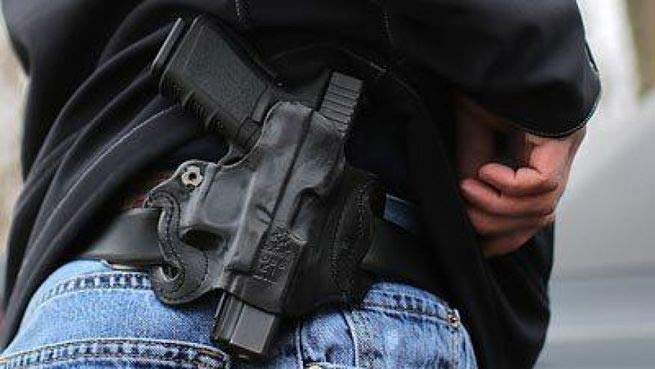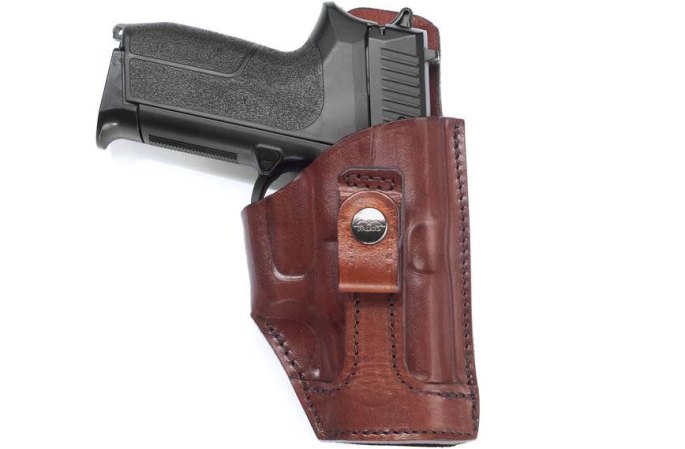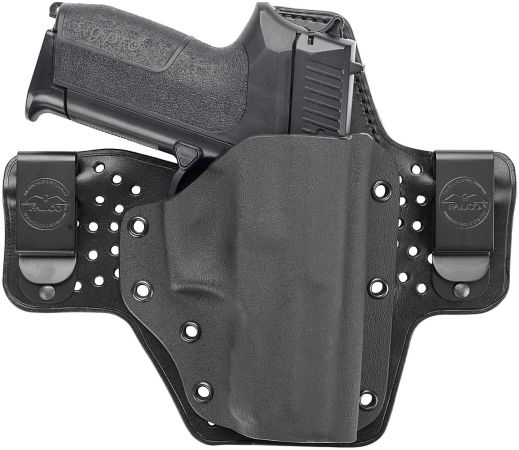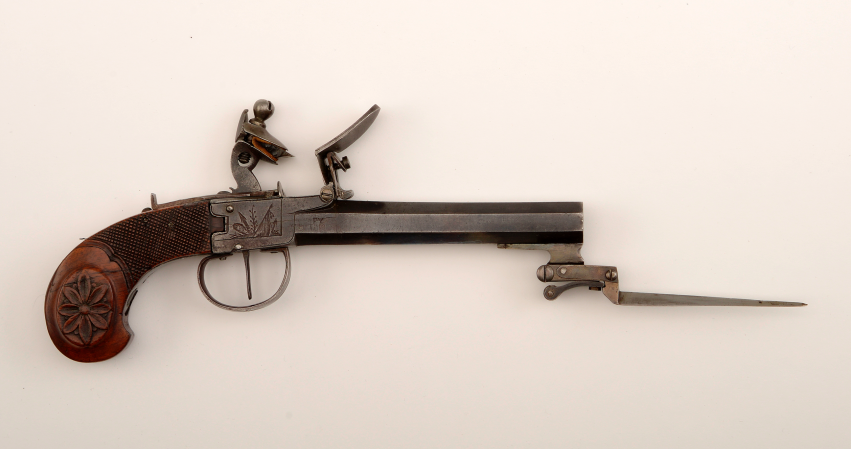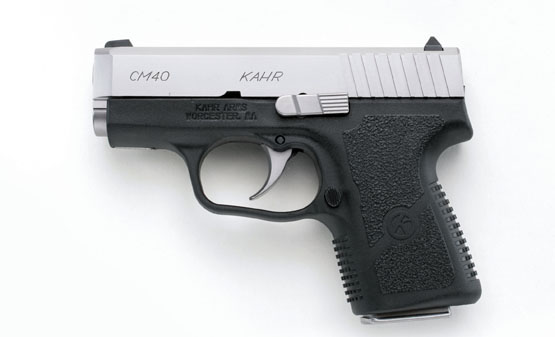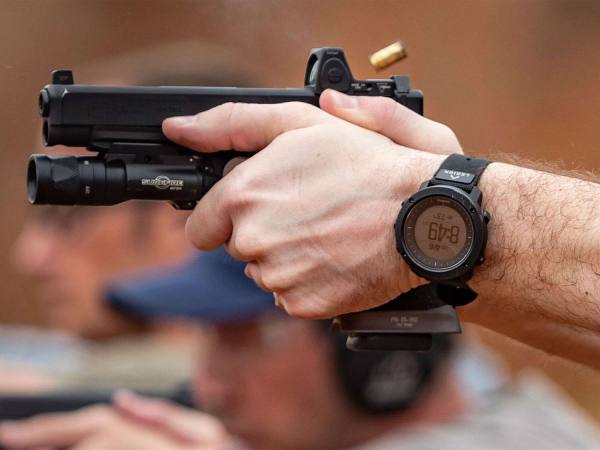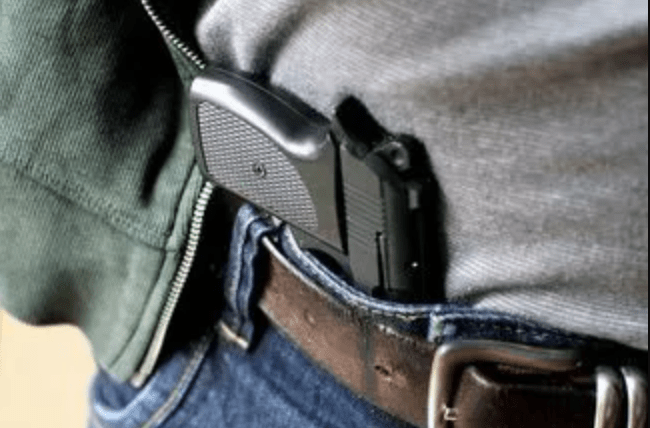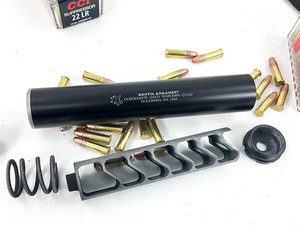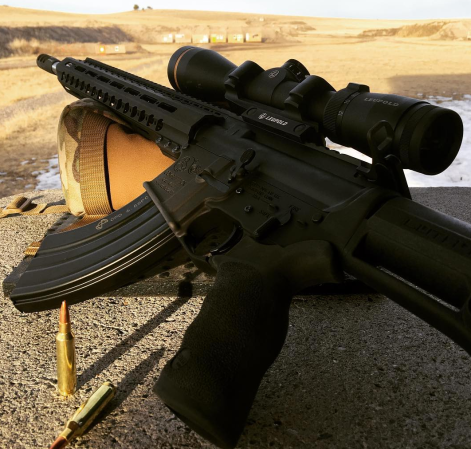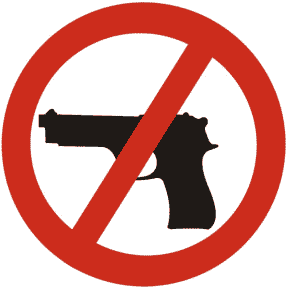We may earn revenue from the products available on this page and participate in affiliate programs. Learn More ›
TOP STORY
Concealed Carry Reciprocity—It’s Now Or Never
On Dec. 6, 2017, the U.S. House of Representatives approved the ‘Concealed Carry Reciprocity Act of 2017’ in a 231-198 vote and passed it along to the Republican-controlled Senate, where it had 40 co-sponsors, anticipating HR 38 would be adopted in 2018.
A year later, the bill remains mired in the Senate Judiciary Committee. If not adopted by Dec. 14, when the Senate adjourns for the year, the near-decade long quest to replace a hodge-podge of state regulations with a uniform, nationwide concealed carry law is dead.
If the Senate does not take the bill up by the end of the 115th Congress — which concludes, essentially, with the Dec. 14 adjournment — it will have to be re-introduced in the House when the 116th Congress convenes in January.
And with Democrats gaining nearly 40 seats in November’s mid-term elections to capture a significant majority in the House, it’s unlikely a new concealed carry reciprocity bill will even be introduced, never mind find any traction whatsoever.
So, it is now or never.
Gun-owners and civil rights advocates are encouraged to call U.S. Senate Majority Leader Mitch McConnell at (202) 224-2541 and Senate Judiciary Chairman Sen. Chuck Grassley at (202) 224-3744 and their U.S. Senators at (202) 224-3121 this week — right now — to get the ‘Concealed Carry Reciprocity Act of 2017’ on the floor, debated and adopted before the session concludes in less than two weeks.
While you are at it, let them know how you feel about the looming prospect of President Donald Trump imposing a federal bump stock ban. The administration initially promised the ban following the October 2017 shooting at a country music festival in Las Vegas, which killed 58 people and injured more than 500, and Trump on several occasions raised the possibility of such a ban several times in the wake of the Valentine’s Day school shooting in Parkland, Fla.
Under the Obama administration, bump stocks were categorized as firearm accessories and not subject to federal regulation. In early 2018, the Justice Department (DOJ) proposed classifying bump stocks within the federal regulations for machine guns.
The Bureau of Alcohol, Tobacco, Firearms, and Explosives (ATF), a DOJ subsidiary agency, is itself uncertain if it has the capacity to regulate bump stocks without authorization from Congress, but now appears ready to enforce a ban if told to do so by the President.
According to numerous sources, Trump appears poised to impose the ban before the end of the year.
For more, go to:
— Concealed Carry Reciprocity Bill may be DOA
— Trump’s shock gun control move
— A Bump Stock Ban Is Reportedly Being Enacted Over A Year After Trump Promised They’d Be “Gone”
— Could ban on bump stocks bring real change to gun control?
— Retired Anti-Gun Justice Reveals Attempts to Thwart Landmark Heller Decision
— Opinion: Research is a must in the gun control debate
— Quotation of the Day: Racial Fairness in Gun Rights Stirs a Debate
— Gun Violence Fact : Violence Prevalent As Much Elsewhere As Here In The United States
— EDITORIAL: Toomey must follow through on gun laws
— National Concealed Handgun Carry Reciprocity – Last Chance to Act
THE BOTTOM LINE
After $55M Revenue Decline, NRA Losing Traction In Elections, Laying Off NRATV Staff
On Tuesday, the Daily Beast reported it had obtained National Rifle Association tax records showing the organization’s income dropped by $55 million from 2016 to 2017.
The National Rifle Association (NRA) saw a $55 million drop in revenue from $367 million in 2016 to $312 million in 2017, according to a Nov. 24 report by the Daily Beast.
Citing the NRA’s Form 990, an annual filing with the Internal Revenue Service required of every nonprofit organization, the Daily Beast reports the NRA received $98 million in contributions in 2017, down from nearly $125 million in 2016, and experienced a decline of about 22 percent in membership dues last year.
Although it did not refer to the revenue decline, NRATV has laid off several employees, according to The Trace, a gun control publication financed by former New York Mayor and billionaire — and possible 2020 Democratic Presidential candidate — Michael Bloomberg.
Cameron Gray, a correspondent and producer for NRATV, confirmed layoffs on Twitter.
“Some personal news: Just shy of my 10-year anniversary, me and several colleagues had their positions terminated this morning,” wrote Gray on Nov. 25 in a since-deleted tweet. “So, if you have or know of any jobs available in the DC-area, or any that can be done remotely, please let me know.”
For more, go to:
— NRA 2017 Tax Records Reveal Decline In Income
— Layoffs hit NRATV after gun-rights group loses $55M in revenue
— Firearms industry appears stuck in the doldrums
— SIG SAUER Introduces SPEC1 Premium Firearm Care System
— Dear NRA: This Isn’t Just My Lane, It’s My %@$#! Highway
— Meet the 3 Deadliest Rifles of the U.S. Military (That Never Made It To the Battlefield)
— Israel sells manufacturer of iconic Uzi submachine gun
STATE ROUNDUP
‘Gunshine State’ GOP No Longer ‘Beholden’ To NRA
Florida has earned the nickname the ‘Gunshine State’ for its relatively lax firearms regulations and the fact that more than 2.1 million residents — roughly one in 10 people in the state—have a concealed weapons permit.
But the fallout from the Valentine’s Day school shooting in Parkland may be changing the political dynamics in a state regarded as a key bellwether in discerning state legislative trends.
And if the results of the 2018 mid-term elections are an indication of what could happen elsewhere, Republicans who support gun control measures may no longer fear the wrath of constituents at the ballot box.
The 2018 Florida legislative session concluded with the adoption of Senate Bill 7026, the Marjory Stoneman Douglas High School Public Safety Act, a quickly-assembled $400 million response to the Parkland Valentine’s Day school shooting that included several controversial gun-control measures.
According to Watchdog.org, gun control advocates are hoping to capitalize on that momentum with a slate of gun control bills to be introduced during the 2019 legislative session, including a petition drive for a 2020 constitutional amendment to ban “assault” weapons.
In adopting SB 7026, the Republican-controlled House and Senate approved, and Republican Gov. Rick Scott signed into law, gun-control measures certain to be opposed by the NRA: raise minimum age to purchase firearms to 21; require a 3-day waiting period to buy firearms; ban “bump stocks;” and give greater authority for law enforcement to seize weapons under “red flag” laws.
According to Watchdog.org, approving such measures would have been politically devastating for most Florida GOP lawmakers as recently as 2016, but mass shootings at Pulse nightclub in Orlando, Fort Lauderdale Airport and Stoneman Douglas High School have changed the political dynamics of the “Gunshine State” because Republican lawmakers who approved SB 7026 faced little to no fallout at the ballot, winning re-election despite being lambasted by the NRA.
“The shifting dynamic and momentum for gun control legislation is underscored by the bottom line: Gun control groups dramatically outspent the NRA and other gun rights groups in the mid-terms,” according to Watchdog.org.
Former New York City Mayor and billionaire Michael Bloomberg’s front group, Everytown For Gun Safety, distributed $3.6 million over the last two months of the mid-term campaign to candidates in an election that saw little to no NRA presence.
Among recipients of Everytown campaign contributions: The Innovate Florida PAC controlled by Senate President Sen. Bill Galvano, which received $500,000 from the gun-control group.
Imagine that: The conservative Republican President of the Florida Senate just accepted $500,000 from the nation’s leading gun-control group.
Although Florida remains a Republican trifecta with the GOP controlling the House, Senate and the Governor’s Office — and Gov.-elect Ron DeSantis has vowed to protect gun-owners’ rights — the bottom line is Republicans are saying their own GOP constituents want tighter gun laws and are growing increasing opposed to the state’s controversial ‘Stand Your Ground’ law.
The bottom line, they say, is they are expressing the will of the people, the wishes of their party constituents, and it is the NRA and other gun rights groups that are out-of-step with an emerging consensus among rank-and-file Republicans that some gun control measures are not only politically acceptable, but a campaign asset.
Keep an eye on Florida’s 2019 legislative session because, you bet, Republicans in state legislatures across the nation will be watching as well. If Republicans in the ‘Gunshine State’ can vote for gun control measures and be re-elected, it can happen anywhere and everywhere.
For more, go to:
— Shifting ‘Gunshine State’ dynamics spur momentum for gun control bills, ballot measures
— Oklahoma: Sen. Nathan Dahm introduces bill that would allow gun owners to carry without training
— R.I. Speaker of House receives student criticism
— NY Senate democrats look toward “common sense” gun laws
— Washington: Ferguson warns of ‘ghost guns’
— Pittsburgh officials pursue a new strategy to push for aggressive gun control measures
— Gun Control Fails New Jersey
— Senator files bill to transfer Florida’s gun permit program to state police
— Virginia: County Working Group Recommends Only Minor Tweaks to Local Gun Laws
— Advocates place gun storage measure among top legislative priorities
— Trial unlikely in University of Wyoming gun ban lawsuit
— New York: Proposed gun bill threatens more than 2nd Amendment
— Tougher Gun Laws Among New Nevada Governor’s Top Priorities
— D.C.: Gun control bill heads to city council vote
IN THE COURTS
Plaintiffs Want Supreme Court To Hear Appeal In Interstate Handgun Sales Prohibition Lawsuit
The Citizens Committee for the Right to Keep and Bear Arms (CCRKBA) has petitioned the Supreme Court to review its case, Mance v Whitaker, challenging the long-standing ban on interstate handgun sales to law-abiding citizens from other states.
A federal district court earlier ruled that the interstate handgun transfer ban is “facially unconstitutional.” That ruling was then reversed by the Fifth Circuit Court of Appeals. which denied the petition for rehearing in a “fractured” 8-7 vote.
The suit was filed by Washington, D.C. residents Tracey and Andrew Hanson, who sought to buy handguns from Fredric Mance, a Texas Federal Firearms Licensed (FFL) retailer. The Hansons were prohibited from doing so because of a ban on interstate handgun sales.
Federal law bars consumers from acquiring hand-guns outside their home state. This prohibition “limits choice and price competition, and forces many hand-gun buyers to arrange and pay for the handguns’ shipment to in-state FFL dealers.”
But there are none in D.C. Therefore, the suit argues, the prohibition denies District residents the right to legally purchase a firearm.
The federal government insists the prohibition is necessary to prevent circumvention of state and local handgun laws.
But according to an analysis by Townhall.com, some jurisdictions allow interstate handgun sales, or preclude the circumvention of handgun laws, through retail channels by requiring police authorization for all handgun transfers.
Meanwhile, as the CCRKBA notes, federal law allows FFLs to sell rifles and shotguns to non-residents, as long as they comply with state and local laws.
The District lacks firearm retailers, but it authorizes interstate handgun sales, and requires that all firearm purchases be authorized by police prior to consumers taking delivery.
The question presented in the lawsuit is whether prohibiting interstate handgun sales, facially or as applied to consumers whose home jurisdictions authorize such transactions, violates the Second Amendment and the equal protection component of the Fifth Amendment’s Due Process Clause.
According to CCRKBA Chairman Alan Gottlieb, the Hansons have been denied the ability to purchase a firearm because of this ban.
“The ban on interstate handgun sales was adopted decades ago, prior to the advent of the National Instant Check System that is now in place. The Hansons have essentially been denied the ability to legally purchase a handgun from a licensed retailer because of this prohibition,” Gottlieb explained. “But our case goes to the heart of what appears to be a reluctance in the lower courts to enforce the Second Amendment even now, more than ten years after the landmark Heller ruling and eight years after the McDonald ruling.”
Gottlieb also pointed out that law-abiding citizens are being denied their Second Amendment rights if they want to purchase a firearm across state lines, similar to other goods.
“Citizens can purchase all sorts of other goods across state lines, but why not the one tool that is specifically mentioned and protected by the Constitution’s Second Amendment? That simply defies logic and common sense,” Gottlieb said.
The lawsuit is being funded by the Second Amendment Foundation (SAF), CCRKBA’s sister organization, which specializes in litigating gun-related cases. Noted gun-rights attorney Alan Gura is representing the plaintiffs.
For more, go to:
— Gun Group Seeks SCOTUS Review Of Mance Interstate Handgun Sales Case
— Pro-Gun Organization Petitions SCOTUS to Hear a Case Regarding Handguns. Here Are The Details.
— CASE CHALLENGING INTERSTATE HANDGUN PURCHASE BANS APPEALED TO SCOTUS
— Parents sue over Duval County school safety assistants
— Court Tells Former NRA President The First Amendment Protects Far More Than Polite Speech
